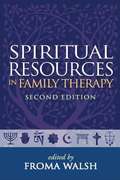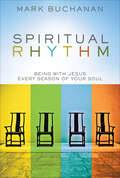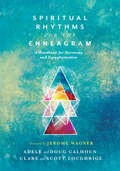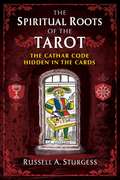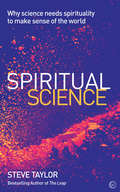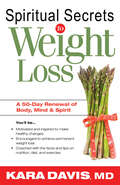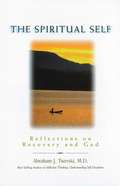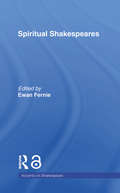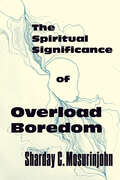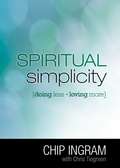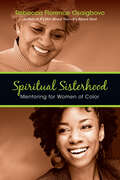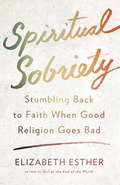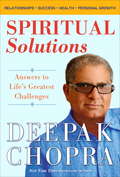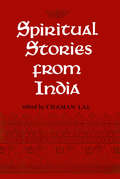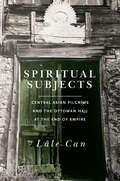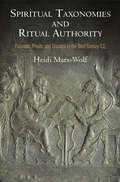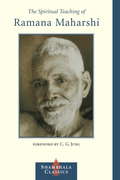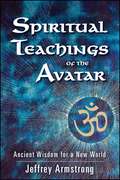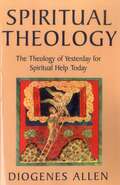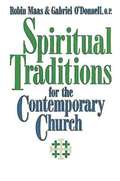- Table View
- List View
Spiritual Resources in Family Therapy, Second Edition
by Froma WalshExploring the role of spirituality in couple and family relationships, this successful text and practitioner guide illustrates ways to tap spiritual resources for coping, healing, and resilience. Leading experts in family therapy and pastoral care discuss how faith beliefs and practices can foster personal and relational well-being, how religious conflicts or a spiritual void can contribute to distress, and what therapists can gain from reflecting on their own spiritual journeys. The volume is rich with insights for working with multi-faith and culturally diverse clients. New to This Edition Coverage of death and loss, healing from refugee trauma, meditation practices for couples, use of rituals, and forgiveness. Chapter on resilience now includes Hindu and Muslim perspectives in addition to Jewish, Christian, and Buddhist views.
Spiritual Rhythm: Being with Jesus Every Season of Your Soul
by Mark Buchanan"Abide in me," Jesus tells us, "and you will bear much fruit." Yet too often we forget that fruit needs different seasons in order to grow. We measure our spiritual maturity by how much we do rather than how we are responding to our current spiritual season.In Spiritual Rhythm, Mark Buchanan replaces our spirituality of busyness with a spirituality of abiding. Sometimes we are busy, sometimes still, sometimes pushing with all we've got, sometimes waiting. This model of the spiritual life measures and produces growth by asking: Are we living in rhythm with the season we are in?With the lyrical writing for which he is known, Mark invites us to respond to every season of the heart, whether we are flourishing and fruitful, stark and dismal, or cool and windy. In comparing spiritual rhythms to the seasons of the year, he shows us what to expect from each season and how embracing the seasons causes our spiritual lives to prosper. As he draws on the powerful words of Scripture, Mark explores what activities are suitable or necessary in each season--and what activities are useless or even harmful in that season.Throughout the book, Mark weaves together stories of young and old, men and women, families, couples, and individuals who are in or have been through a particular season of the heart. As Mark writes, "I pray that this book meets you in whatever season you're in, and prepares you for whatever seasons await. I pray that it helps you find your voice, your stride, your rhythm, in season or out. Mostly, I pray that you, with or without my help, find Christ wherever you are. And that, even more, you discover that wherever you are, he's found you."
Spiritual Rhythms for the Enneagram: A Handbook for Harmony and Transformation
by Adele Ahlberg Calhoun Doug Calhoun Clare Loughrige Scott Loughrige Jerome WagnerThe Enneagram opens a remarkable window into the truth about us, enabling us to see how image, wounds, lies, triggers, and default responses shape us every bit as much as our faith. But simply diagnosing our number doesn't do justice to who we are. Nor does it necessarily change us or our relationships. Transformation happens as we grow in awareness and learn how to engage and reflect God's image. And relational repair then results as we apply Enneagram insights to the rhythms and grooves of our ordinary daily lives. For those who have learned about the Enneagram and wonder "What's next?"—this handbook is the answer. Filled with exercises to engage, challenge, encourage, and sustain, Spiritual Rhythms for the Enneagram will help us grow in greater awareness and lead us to spiritual and relational transformation. Including new insight on the Enneagram and the Harmony Triads, and offering helpful "Soul Resources" in the appendix, this handbook can be used by individuals or groups.
The Spiritual Roots of the Tarot: The Cathar Code Hidden in the Cards
by Russell A. SturgessLearn the path to enlightenment and inner peace encoded by the Cathar in the Major Arcana of the Marseille Tarot • Reveals how the secret wisdom teachings of the heretical Cathar sect were hidden in plain sight in the imagery of the Major Arcana of the Marseille Tarot deck • Decodes each of the cards in detail and shows how they offer clear instructions for recalibrating human consciousness and achieving enlightenment • Shares the author&’s self-development program, based on the wisdom of the cards, for creating a lifestyle filled with peace, joy, good health, and meaning The Holy Grail has been discovered. Not a cup or chalice as myth leads us to believe, the Holy Grail is sacred knowledge of the path to enlightenment and inner peace. While author Russell Sturgess was conducting research on the Marseille Tarot, he found evidence that this tarot deck, while masquerading as a simple card game, held the teachings of an ancient heretical religious group from southern France, the Cathar, believed to be the keepers of the Holy Grail. To avoid persecution by the papacy, this sect used portable art like illuminations to convey their Gnostic Christian teachings, in the same way the stained glass windows of churches spoke to their congregations. This portable Cathar art then inspired the creation of the Tarot. After his breakthrough discovery of a hidden key on the Magician and Strength cards, Sturgess examined the Major Arcana cards further and used the key to unlock their symbolism, discovering clear instructions for recalibrating human consciousness and achieving enlightenment, with specific cards representing pivotal points in making the journey from ignorance to awareness. Decoding the cards in detail, the author shows how they reveal a journey of transformed consciousness that can result in finding what the Cathar called &“the kingdom of heaven.&” Calling this sacred knowledge &“the Cathar Code,&” Sturgess reveals his personal development program based on the Code that opens access to a meaningful lifestyle filled with peace and joy and that naturally fosters health and well-being. He shows how these teachings offer a clear path that transforms a life burdened by fear of failure, rejection, and scarcity into one with clarity of purpose, self-honoring, kindness, and the abundance that comes with making a fulfilling difference in the world.
Spiritual Science: Why Science Needs Spirituality to Make Sense of the World
by Steve TaylorIt is often assumed that there are two ways of interpreting the world: a rational scientific way, or an irrational religious way. Spiritual Science offers a third alternative: a spiritual view of reality that transcends both conventional science and religion, and answers many of the riddles that neither can explain. The standard model of science has had little success in explaining such areas as human consciousness, the connection between the mind and the body, altruism and ‘anomalous’ phenomena such as near-death experiences, psi phenomena (such as telepathy) and spiritual experiences. But from a ‘panspiritist’ point of view – which sees spirit or consciousness as a fundamental essence of reality – it is possible to make sense of all these things. Steve Taylor puts forward the evidence for a spiritual view of reality, drawing on the insights of philosophers, physicists, mystics, as well as spiritual traditions and indigenous cultures. He systematically shows how a ‘panspiritist’ view can explain many puzzling aspects of science and the world, including evolution and the origins of life, and a wide range of other phenomena such as quantum physics, the placebo effect, precognition and neuroplasticity. Spiritual Science offers a new vision of the world that is compatible with both modern science and ancient spiritual teachings. It provides a more accurate and holistic account of reality than conventional science or religion, integrating a wide range of phenomena that are excluded from both. After showing how the materialist worldview demeans the world and human life, Spiritual Science offers a brighter alternative – a vision of the world as sacred and interconnected, and of human life as meaningful and purposeful.Spiritual Science explains how the standard materialist model of reality developed, and turned into a belief system. This belief system can only function by denying (or explaining away) a whole range of phenomena that are part of human experience. It is possible to be scientific without adopting this belief system – in fact, it is much more rational to do so.
Spiritual Secrets To Weight Loss: A 50-Day Renewal of the Mind, Body, and Spirit
by Kara DavisThe easy-to-use 50-day format of "Spiritual Secrets to Weight Loss" emphasizes both the physical and spiritual aspects of weight loss and encourages positive health habits and long-term lifestyle changes. The secrets to permanent weight loss lie in understanding the power of God.
The Spiritual Self: Reflections on Recovery and God
by Abraham J TwerskiTo the thicket of questions surrounding spirituality, this book brings a clear vision and a thoughtful approach that will help us find our way to the very heart of it.Much is made of spirituality these days-in recovery and in the culture at large-but what, exactly, does spirituality mean? Is it something different to different people? How is it discovered, nurtured, expressed? And, perhaps most important, why does it matter? To the thicket of questions surrounding the subject, this book brings a clear vision and a thoughtful approach that will help us find our way to the very heart of spirituality. Writing simply and directly, Abraham Twerski shows how spirituality-independent of religion-is central to emotional and mental health, and is a key to being truly and profoundly human. Founder and medical director of the Gateway Rehabilitation Center in Pittsburgh, Pennsylvania, Abraham J. Twerski is a rabbi, psychiatrist, chemical dependency counselor, and the author of many books, including Addictive Thinking: Understanding Self-Deception.
The Spiritual Senses
by Sarah Coakley Paul L. GavrilyukIs it possible to see, hear, touch, smell and taste God? How do we understand the biblical promise that the 'pure in heart' will 'see God'? Christian thinkers as diverse as Origen of Alexandria, Bonaventure, Jonathan Edwards and Hans Urs von Balthasar have all approached these questions in distinctive ways by appealing to the concept of the 'spiritual senses'. In focusing on the Christian tradition of the 'spiritual senses', this book discusses how these senses relate to the physical senses and the body, and analyzes their relationship to mind, heart, emotions, will, desire and judgement. The contributors illuminate the different ways in which classic Christian authors have treated this topic, and indicate the epistemological and spiritual import of these understandings. The concept of the 'spiritual senses' is thereby importantly recovered for contemporary theological anthropology and philosophy of religion.
Spiritual Shakespeares (Accents on Shakespeare)
by Ewan FernieSpiritual Shakespeares is the first book to explore the scope for reading Shakespeare spiritually in the light of contemporary theory and current world events. Ewan Fernie has brought together an exciting cast of critics in order to respond to the ‘religious turn’ in recent literary theory and to the spiritualized politics of terrorism and the ‘War on Terror’. Exploring a genuinely new perspective within Shakespeare Studies, the volume suggests that experiencing the spiritual intensities of the plays could lead us back to dramatic intensity as such. It tests spirituality from a political perspective, as well as subjecting politics to an unusual spiritual critique. Amongst its controversial and provocative arguments is the idea that a consideration of spirituality might point the way forward for materialist criticism. Reaching across and beyond literary studies to offer challenging and powerful contributions from leading scholars, this book offers unique readings of some very familiar plays.
The Spiritual Significance of Overload Boredom
by Sharday C. MosurinjohnThe spiritual crisis of the twenty-first century is overload boredom. There is more information, content, and stimulation than ever before, and none of it is waiting passively to be consumed. The demands exceed our capacities.The Spiritual Significance of Overload Boredom makes the case that withdrawal and resistance are not our only options: we can choose kēdia, an ethic of care. Rather than conceiving the world of information as external, Sharday Mosurinjohn turns to the sensational and emotional, focusing on the ways the digital age has radically reconfigured our interior lives. Using an innovative method of affective aesthetic speculation, Mosurinjohn engages the world of art, literature, and comedy for a series of unexpected case studies that make strange otherwise familiar scenes of overload boredom: texting, browsing social media, and performing information work. Ultimately, she shows that the opposite of boredom is not interest but meaning, and that we can only make it by curating the overload.The Spiritual Significance of Overload Boredom is a bold and original intervention for the present condition, unsettling the framing of existing work around technological modernity and its discontents.
Spiritual Simplicity
by Chris Tiegreen Chip IngramChanging "Love" from a Noun to a Verb In our frantically driven, complex lifestyle, we suffer from fatigue, little margin, shallow relationships, and fractured families. As a result of this driven lifestyle, our souls are dis-eased--they have a lack of ease. This highly practical, comforting book maintains that it is possible to run the race at a different, more meaningful speed. Not only is it possible; it's absolutely necessary. The key to simplifying life, Chip Ingram says, is to make sure love is your #1 priority. Love redirects our focus and unravels the complex, overextended lifestyle that keeps us ever running but never arriving. In Spiritual Simplicity, Ingram explains how to change our love from a noun to a verb and choose to concentrate on what really matters: the people we love the most. Each chapter ends with probing questions to help you process, ponder, and discuss the life-giving principles laid out in this desperately needed book. *** If you crave simplicity, yearn for peace and calm, this book is for you. Through biblical teaching and practical insights, author Chip Ingram goes beyond so-called quick fixes and speaks to men and women who know what they need to do, want desperately to do it, but find it next to impossible to break free of the too many good and important things that flood their lives. The thesis of this book is very simple: Spiritual simplicity will never be achieved by strategic, managerial attempts to control our lives and schedules but through doing less because we love more. As you learn the practice of loving people, you will experience a shift from complex to simple, from hurried to peaceful, from "never enough time" to "time enough for those you love." Lasting change is within your reach.
Spiritual Sisterhood: Mentoring for Women of Color
by Rebecca Florence OsaigbovoIn these pages, author and speaker Rebecca Florence Osaigbovo calls all sisters to either become a spiritual mother or be mentored by one. In fact, she believes the survival of African American communities depends on the renewal of mentoring relationships. Having spent many years as both a mentor and a mentee, Osaigbovo provides here the resources needed for effective, life-giving, mentoring relationships, including help forfinding someone to mentor or someone to mentor youdeciding what to do togetheravoiding pitfallsreaching across the age gap, whether older to younger or younger to olderIn addition, you'll read stories from real mentors and mentees that reveal the life-change and lasting effects that come from vibrant mentoring relationships. Older, spiritually mature African American women also offer their wise words of advice, gleaned from years of serving as spiritual mothers to others. Whether you're in a family, workplace, school or ministry context, whether you're young or old, you can begin a mentoring relationship. Let Rebecca Florence Osaigbovo and her spiritual sisters and mothers show you how.
Spiritual Sobriety: Stumbling Back to Faith When Good Religion Goes Bad
by Elizabeth EstherIt's easy to get high on God in America. But is this good religion? In a compelling follow-up to her memoir, Girl at the End of the World, Elizabeth Esther explores how religious fervor can become religious addiction. The evidence is everywhere. In families who inexplicably choose to harm their children in order to abide by cultic church doctrine. But in ordinary believers too who use God the same way addicts use drugs or alcohol--to numb pain, alter their mood, or simply to escape the realities of this messy, unpredictable thing called life. If you've ever wondered how a religion that preaches freedom and love can produce judgmental and unkind followers; if you've ever felt captive to the demanding God of your own childhood; if you've struggled to find contentment without needing another emotional hit from a "life-changing" conference or "mountain-top" experience, then Spiritual Sobriety is for you. The author, who grew up in a hyper-controlling church cult, will help you find hope and rebirth in the ruins of disillusioned faith. Filled with stories and warm, practical advice, Spiritual Sobriety offers a gentle path out of the desperate cycles of craving-euphoria-hangover and into a freer, clean-and-sober faith practice.
Spiritual Solutions
by Deepak ChopraLife is full of challenges, both big and small. Spirituality is here to offer solutions. Over the course of his career as physician, teacher, and bestselling author, Deepak Chopra has received thousands of questions from people facing every kind of challenge. They have asked how to lead more fulfilling lives, how to overcome relationship problems and personal obstacles. What's the best way to deal with a passive-aggressive friend? Can a stagnant career be jump-started? In a world full of distractions and stress, how does one find time for meditation? Hidden among all of these questions are answers waiting to be uncovered. In this groundbreaking book, Chopra shows you how to expand your awareness, which is the key to the confusion and conflict we all face. "The secret is that the level of the problem is never the level of the solution," he writes. By rising to the level of the solution in your own awareness, you can transform obstacles into opportunities. Chopra leads the reader to what he calls "the true self," where peace, clarity, and wisdom serve as guides in times of crisis. For Chopra, spirituality is primarily about consciousness, not about religious dogma or relying on the conventional notion of God. "There is no greater power for success and personal growth than your own awareness." With practical insight, Spiritual Solutions provides the tools and strategies to enable you to meet life's challenges from within and to experience a sense of genuine fulfillment and purpose.
Spiritual Stories from India
by Chaman Lal"India is the home of fables," says Mr. Lal in his preface to the book. "When God made the world, He gave many virtues to different nations. To India He gave wisdom as a special gift....The Stories presented in this book are full of wisdom. They illustrate what miracles can be wrought by faith in God. They tell us what we can learn from nature. What tolerance and love can bring to humanity....
Spiritual Stories from India
by Chaman Lal"India is the home of fables," says Mr. Lal in his preface to the book. "When God made the world, He gave many virtues to different nations. To India He gave wisdom as a special gift....The Stories presented in this book are full of wisdom. They illustrate what miracles can be wrought by faith in God. They tell us what we can learn from nature. What tolerance and love can bring to humanity....
Spiritual Stories from India
by Chaman Lal"India is the home of fables," says Mr. Lal in his preface to the book. "When God made the world, He gave many virtues to different nations. To India He gave wisdom as a special gift...The Stories presented in this book are full of wisdom. They illustrate what miracles can be wrought by faith in God. They tell us what we can learn from nature. What tolerance and love can bring to humanity...
Spiritual Subjects: Central Asian Pilgrims and the Ottoman Hajj at the End of Empire
by Lale CanAt the turn of the twentieth century, thousands of Central Asians made the annual pilgrimage to Mecca. Traveling long distances, many lived for extended periods in Ottoman cities dotting the routes. Though technically foreigners, these Muslim colonial subjects often blurred the lines between pilgrims and migrants. Not quite Ottoman, and not quite foreign, Central Asians became the sultan's spiritual subjects. Their status was continually negotiated by Ottoman statesmen as attempts to exclude foreign Muslim nationals from the body politic were compromised by a changing international legal order and the caliphate's ecumenical claims. Spiritual Subjects examines the paradoxes of nationality reform and pan-Islamic politics in late Ottoman history. Lâle Can unravels how imperial belonging was wrapped up in deeply symbolic instantiations of religion, as well as prosaic acts and experiences that paved the way to integration into Ottoman communities. A complex system of belonging emerged—one where it was possible for a Muslim to be both, by law, a foreigner and a subject of the Ottoman sultan-caliph. This panoramic story informs broader transregional and global developments, with important implications for how we make sense of subjecthood in the last Muslim empire and the legacy of religion in the Turkish Republic.
Spiritual Taxonomies and Ritual Authority: Platonists, Priests, and Gnostics in the Third Century C.E. (Divinations: Rereading Late Ancient Religion)
by Heidi Marx-WolfThe people of the late ancient Mediterranean world thought about and encountered gods, angels, demons, heroes, and other spirits on a regular basis. These figures were diverse, ambiguous, and unclassified and were not ascribed any clear or stable moral valence. Whether or not they were helpful or harmful under specific circumstances determined if and what virtues were attributed to them. That all changed in the third century C.E., when a handful of Platonist philosophers—Plotinus, Origen, Porphyry, and Iamblichus—began to produce competing systematic discourses that ordered the realm of spirits in moral and ontological terms.In Spiritual Taxonomies and Ritual Authority, Heidi Marx-Wolf recounts how these Platonist philosophers organized the spirit world into hierarchies, or "spiritual taxonomies," positioning themselves as the high priests of the highest gods in the process. By establishing themselves as experts on sacred, ritual, and doctrinal matters, they were able to fortify their authority, prestige, and reputation. The Platonists were not alone in this enterprise, and it brought them into competition with rivals to their new authority: priests of traditional polytheistic religions and gnostics. Members of these rival groups were also involved in identifying and ordering the realm of spirits and in providing the ritual means for dealing with that realm. Using her lens of spiritual taxonomy to look at these various groups in tandem, Marx-Wolf demonstrates that Platonist philosophers, Christian and non-Christian priests, and gnostics were more interconnected socially, educationally, and intellectually than previously recognized.
The Spiritual Teaching of Ramana Maharshi
by C. G. Jung Ramana MaharshiThe renowned Indian sage Ramana Maharshi is beloved by Buddhists, Hindus, Christians, and Taoists alike for the inspirational power of his teachings, which transcend all religious differences. Here is a collection of Sri Ramana's instructions and discourses culled from three works: Who Am I? , Spiritual Instructions , and Maharshi's Gospel. These teachings are arranged by topics such as work and renunciation, silence and solitude, peace and happiness, and the discipline of self-inquiry. Reading this book, presented in question-and-answer format, evokes the feeling of being with this outstanding teacher at one of his intimate teaching sessions.
The Spiritual Teaching of Ramana Maharshi
by C. G. Jung Ramana MaharshiThe renowned Indian sage Ramana Maharshi is beloved by Buddhists, Hindus, Christians, and Taoists alike for the inspirational power of his teachings, which transcend all religious differences. Here is a collection of Sri Ramana's instructions and discourses culled from three works: Who Am I? , Spiritual Instructions , and Maharshi's Gospel. These teachings are arranged by topics such as work and renunciation, silence and solitude, peace and happiness, and the discipline of self-inquiry. Reading this book, presented in question-and-answer format, evokes the feeling of being with this outstanding teacher at one of his intimate teaching sessions.
Spiritual Teachings of the Avatar: Ancient Wisdom for a New World
by Jeffrey ArmstrongSpiritual Teachings of the Avatar speaks to anyone concerned with the sustainability of Mother Earth, the role of elders in our society, the seemingly unconsciousness of science and corporations, and the subtleties of unseen realities, resulting in spiritual growth, a deeper relationship with nature, and a better world for all. An avatar is a manifestation of the Supreme Being--usually in human form--that descends from the transcendental realm to Earth to heal the planet and restore peace and harmony by eliminating the harmful souls that prey on Mother Earth. In Spiritual Teachings of the Avatar, Vedic expert and teacher Jeffrey Armstrong explains the ancient Indian wisdoms embodied in the word "avatar," and that behind the notion of avatar is a view that sees the sacredness of all life and the soul of all beings as eternal--meant for freedom and made of divine essence.
Spiritual Teachings of the Avatar
by Jeffrey ArmstrongSpiritual Teachings of the Avatar speaks to anyone concerned with the sustainability of Mother Earth, the role of elders in our society, the seemingly unconsciousness of science and corporations, and the subtleties of unseen realities, resulting in spiritual growth, a deeper relationship with nature, and a better world for all. An avatar is a manifestation of the Supreme Being--usually in human form--that descends from the transcendental realm to Earth to heal the planet and restore peace and harmony by eliminating the harmful souls that prey on Mother Earth. In Spiritual Teachings of the Avatar, Vedic expert and teacher Jeffrey Armstrong explains the ancient Indian wisdoms embodied in the word "avatar," and that behind the notion of avatar is a view that sees the sacredness of all life and the soul of all beings as eternal--meant for freedom and made of divine essence.
Spiritual Theology: The Theology Of Yesterday For Spiritual Help Today (The\new Church's Teaching Ser.)
by Diogenes AllenOften spirituality today is isolated from church teaching and doctrine, as in Joseph Campbell’s treatment of myth and the many forms of New Age theologies, but doctrine apart from the life of prayer is abstract and sterile. In Spiritual Theology Allen turns to the great teachers of the past―the church fathers, Augustine, Maximus the Confessor, Bonaventure, Hugh of St. Victor, Calvin and Luther, George Herbert―to recover a spirituality that is rich with the doctrines and disciplines of theology. Allen covers the great questions of the spiritual life: what is the Christian goal? what leads us toward that goal, and what hinders us? what is conversion? how can we discern our progress in the spiritual life? what are the fruits of the Spirit? A second purpose of the book is to introduce readers to the disciplines and texts of the threefold way, found in the eastern church from the fourth century on. Allen writes simply and clearly of the active life and the development of virtue, and the contemplative life, which includes coming to know God through the Book of Nature and the Book of Scripture as well as directly, face to face, which is the domain of mystical theology.
Spiritual Traditions for the Contemporary Church
by Robin Maas Gabriel OdonnellThis volume offers a comprehensive intellectual and experiential introduction to Christian spirituality. It embraces spiritual traditions from the Patristic period to the present day. Part I, "The Roots of Contemporary Western Spirituality," covers spiritual types that have been fundamental in shaping spiritual practice. Part II, "Distinctive Spiritual Traditions," offers major introductory essays on spiritual traditions formed by such notable figures as Luther, Wesley, Ignatius, and John of the Cross, as well as ecclesiastical traditions such as Anglicanism. Part III, "The Feminine Dimension in Christian Spirituality," is devoted to Marian Spirituality, holy women, and feminism. Each of the fourteen chapters is followed by a practicum which enables readers to assimilate the practice prescribed into their own devotional life .
